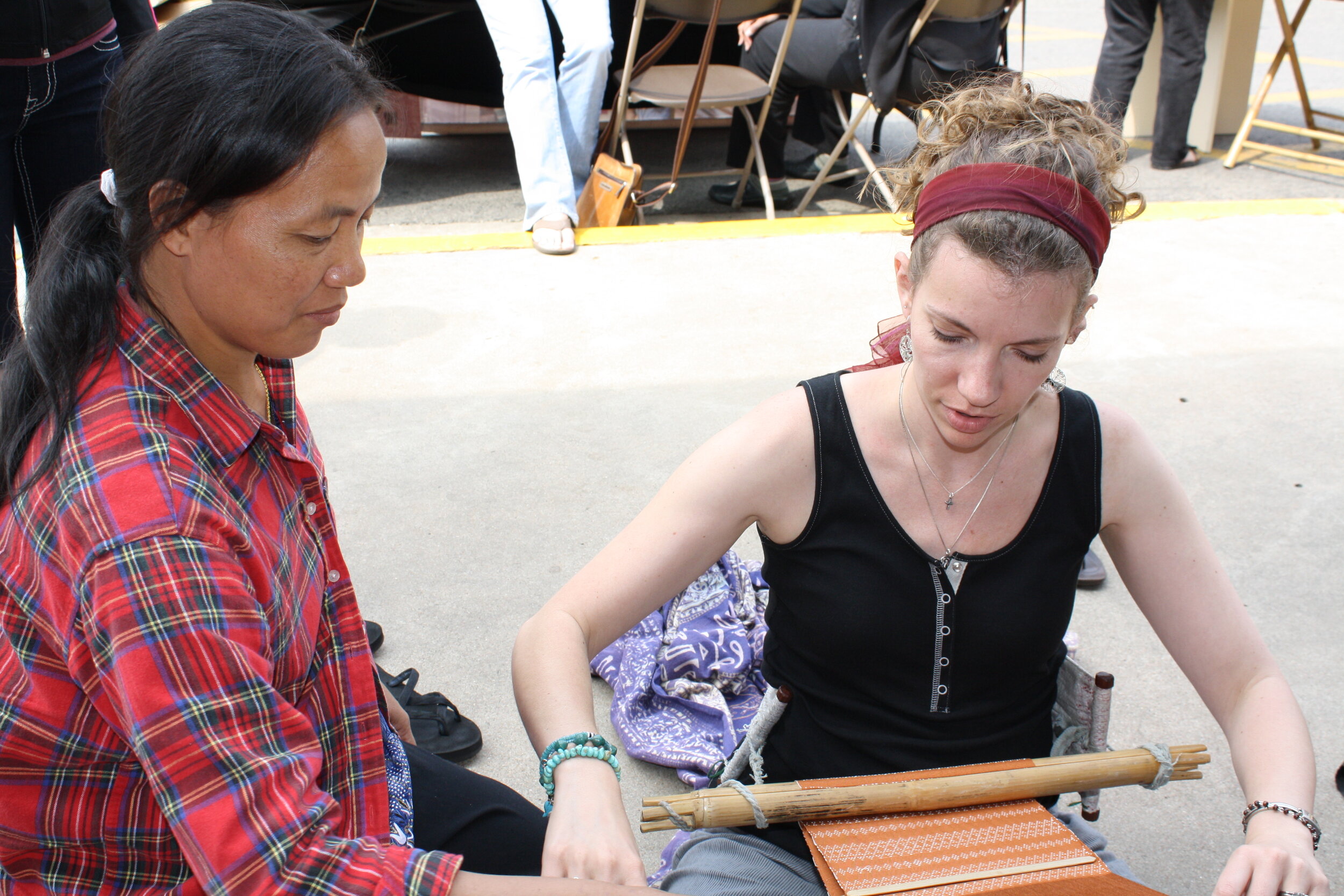In October 2007, I volunteered at a fall festival at a local community center to translate for Spanish-speakers. Instead, I met a group of Burmese refugees who changed my life forever. Mu Naw, who the book is about (and who is not in any of these pictures), was my first former refugee friend—the level of my ignorance in those days was staggering. There was a whole group of us who started hanging out with former refugees and over time, my friend Caren George and my husband Jonathan and I started a nonprofit called Hill Tribers to provide supplemental income to Burmese refugee artisans (mostly weavers, but several jewelry-makers and sewers too). The nonprofit lasted for seven years, until we successfully ended when the last artisan got a full-time job.
It sounds official, but the picture above captures what it mostly was—we met every other Wednesday morning and offered connection, friendship, language-learning, and a chance to earn a living using skills that had been passed down for generations. I learned over time from my friends what it meant to be a refugee—the danger of war, the ennui of camp, the tumultuousness of this new life. One of my heroes, Dr. Salai Tun Thawn (above right), translated for us: he has a doctorate in Agronomy from the University of Wisconsin and when he protested against the government’s treatment of his people, he was arrested immediately. He gained international attention when he staged a hunger strike just to get his Bible in jail. Over thirty women worked with us in those seven years; many of them moved to other places, but I’m friends with several of them to this day. Our kids have grown up together.
Photos by Kelsi Klembara.
I started the nonprofit while I was getting a PhD in English literature at the University of Texas; I’m an inter-Americanist—I study literature at the intersection of the Americas. My dissertation focused on Elizabeth Bishop and her circle in mid-twentieth-century Brazil and I speak Portuguese and Spanish. I assumed when I left graduate school and the artisans all got jobs that I had closed that chapter of my life and was moving into my academic career. I was a Mellon Postdoctoral Writing Fellow and then Interim Writing Center Director at Southwestern University. I was beginning the process of deciding if I would go on the academic market or stay in an administrative role when everything changed for refugees in 2015. Suddenly the term ‘refugee,’ which had always invoked compassion, was being used in politics and the media in ways that had nothing to do with what my friends had really endured.
I’ve often compared the shift that happened next in my career to what my grandmother described those years during World War II when everybody did their part: she turned her flower plot into a victory garden; I turned my academic career into a writing one. I knew refugees and political history; I was uniquely placed to tell the stories of people around me and to position our current moment in the larger narrative of our country’s treatments of displaced people. I couldn’t write fast enough to keep up with the people who wanted me to correct the public’s misunderstanding of what it means to be a refugee—not just from Myanmar but friends from Iraq and Burundi and Syria and Afghanistan. The relationships I’d built over years of hanging out on porch stoops and eating together around bulging tables gave me access to people who would be reticent to share the truth of their lives with outsiders but didn’t mind talking to a friend.
On January 27, 2017, when the first travel ban went into place, a Syrian-American advocate I know called me and I tweeted what he told me: a family who showed up at the airport in Jordan ready to be resettled in Texas, who had done everything right for over two years, were told they were no longer welcome in our country. I turned off my phone and went to bed; the next morning, I woke up to chaos—more than 12,000 retweets and an inbox full of messages from editors and journalists. I’ve been writing steadily ever since; one of my first pieces from that time led me to Hasna. When I met her, I knew I could write her story. The relationship I have with Mu Naw and Hasna, as well as Amena, who translated Hasna’s story, is unlike any other. There is no correlation for the intimacy of crafting their stories together over intense conversations every couple of weeks for two years. Our lives are grafted together; they’ve changed me at a core level. I signed with my dream agent in May 2017 and we sold my book to the very best editor in the world at Viking in July 2017. I threw myself into chronicling the history of a federal program that had once been a source of bipartisan pride and was now being targeted by the branch of government tasked with overseeing it, and the stories of two women I love for whom that program offered a chance of new life and hope and freedom at last.
This career is wilder and more wonderful than anything I could have imagined. Instead of teaching students how to write literary analysis of poetry and novels, I drink coffee and record stories of displaced people. I get to teach in an incredible low-residency MFA program at Wilkes University and otherwise write full time. In this mercurial time in our country, this is my part—to ethically and authentically bring the stories of people who have become vulnerable because of war or persecution or cruel policies or oppressive systems that keep them from being able to speak out to an audience that needs to hear who they really are and what really happened.


